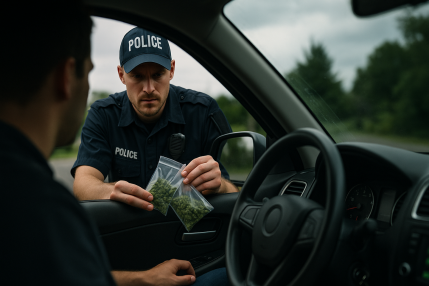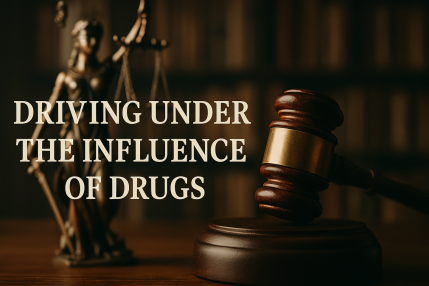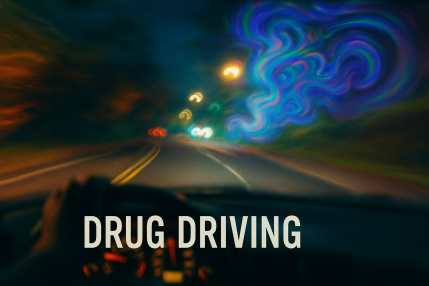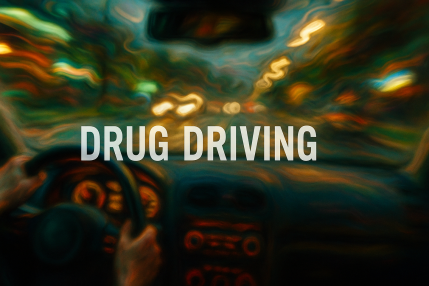If someone is suspected of drug driving, this may result not only in police action but also in criminal proceedings.
In many cases, the defendant is not even aware of what “drug impairment” means in criminal law, or of the differences between drink driving and drug driving.
This article helps to clarify the details of the offence under Section 237 of the Criminal Code and also explains what a person can expect if such charges are brought.
The protected legal interest of drug driving – just like in the case of drink driving – is the societal interest in the safety of traffic and transportation, as well as the protection of human life, physical integrity, and health.
The legislator responds to this conduct with criminal sanctions, since a person under the influence of drugs clearly represents an increased risk to other participants in road, waterway, rail, or air traffic.

The offence of drug driving can be committed by operating any type of vehicle if the driver is under the influence of a substance that impairs driving ability at the time of driving.
In order to establish criminal liability, it must be proven beyond reasonable doubt that at the time of driving the accused was indeed under the influence of such a substance.
Of course, such a state can arise from many causes, but in order to establish the offence, it is required that the offender has voluntarily induced this impaired state.
Whoever, under the influence of a substance impairing driving ability – except alcohol – operates a rail vehicle or aircraft, a motor-powered watercraft, or a motor vehicle on a public road or a private road not closed to traffic, commits a criminal offence.
The term “substance impairing driving ability” is not precisely defined by the law.
The legislator explicitly excludes alcohol from this statutory provision, even though it also impairs driving ability, because drink driving is punishable under a separate provision.
Under this term, we must understand natural or synthetic chemical compounds or substances that can produce effects similar to alcohol.
Among the physiological reactions, those must be highlighted in particular that reduce the driver’s inhibitions and, together with other physiological impacts, endanger road safety.

The difference between the two states lies not only in the characteristics of the substances that cause them, but also in their criminal assessment.
Drink driving, depending on the amount of alcohol consumed, may be sanctioned either as an administrative offence, as a regulatory infringement subject to a fine, or as a criminal offence, with the legislator defining the exact threshold by numerical values.
By contrast, drug driving, if the impairing effect is established, always constitutes a criminal offence.
The explanation for this lies primarily in the fact that the effects of alcohol on a given individual are generally known to the consumer, giving them more freedom to decide whether to consume it, and if so, in what quantity.
The adverse effects of drugs and other psychoactive substances not classified as narcotics on driving ability, however – partly because of their variety, partly because of their individually differing effects – cannot be quantified in general terms. Therefore, the establishment of drug driving still requires expert evidence to prove impairment.
Otherwise, the statutory elements of drug driving are identical to those of drink driving.


Under Section 237 of the Criminal Code, drug driving is a criminal offence (classified as a minor offence under Hungarian law), and in the basic form it is punishable by up to two years of imprisonment. However, when imposing a concrete penalty, the court considers several circumstances:
If an accident occurred and even minor injuries resulted, the offence is considered more serious, and additional statutory offences (such as negligent bodily harm) may apply.
In the most serious cases (fatal accidents), the driver may be sentenced to years of imprisonment.

The investigating authority usually:
The court decides, on the basis of expert opinions, whether the driver was indeed under the influence of drugs, and to what extent this impaired their driving ability.
Driving under the influence of drugs (Section 237 of the Criminal Code) is in itself a serious criminal offence, even if no accident occurs.
The combination of psychoactive substances and road traffic is unpredictable and dangerous.
If a person is charged with drug driving, it is advisable to seek the help of a criminal defence lawyer already in the investigation phase, as the evidentiary process involves many aspects (e.g. toxicology results, expert opinions, identification of mitigating circumstances) that require professional expertise.
This page is general information, not legal advice. For guidance on your specific situation in Budapest, Hungary, consult a qualified criminal defense lawyer.
